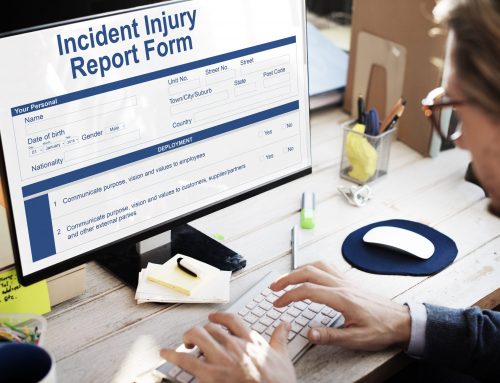£18bn
Alcohol misuse costs the UK 18 billion Pounds a year [1].
With substance abuse being linked to 60% of all poor performances and 40% of industrial accidents at work, it’s not hard to see how the reduced productivity adds up.
In today’s fast-paced work environment, ensuring the safety and well-being of both employees and the wider public is paramount.
Drug testing in the workplace plays a pivotal role in this, helping employers maintain a productive, safe, and compliant environment.

In today’s fast-paced work environment, it’s essential for employers to be vigilant about the well-being of their staff.
One of the challenges that HR managers and supervisors might face is addressing the issue of employees working under the influence of alcohol.
Recognising the signs early can make a significant difference, both for job performance, the individual concerned and the wider team.
In this article, we’ll cover:
- Is drinking at work illegal?
- What are the potential signs of an employee alcohol problem?
- What to do if you suspect someone is drinking alcohol at work?
- Employee drinking FAQs
However, a common misconception we often hear is,
“If I introduce employer drug testing, will too many positive results mean I lose my workforce overnight?”
At Racoo, we understand these concerns and are here to guide you through a balanced approach that prioritises both safety and staff retention.
What is drug and alcohol screening?
In the UK, drug and alcohol screening is a proactive measure taken by employers to ensure a safe and productive workplace.
It can be conducted randomly, pre-announced, pre-employment and ‘for-cause’ (when you have a suspicion that an employee is taking illegal substances at work.
Screening helps identify potential substance misuse, safeguarding both the individual and their colleagues. It supports health, safety, and the highest professional standards.
The importance of drug and alcohol testing in the workplace
The influence of drugs can severely hamper an employee’s performance, judgement, and reaction times.
Ultimately, it’s been show to lead to:
- Decrease productivity & quality: Reduced work quality, increased absenteeism, and presenteeism [2].
- Create safety concerns: Impaired judgement from substance misuse heightens the risk of workplace accidents and injuries [3].
- Create staffing challenges: High turnover rates necessitate frequent rehiring and retraining, while substance abuse can also lead to legal complications [2].
- Affect employee well-being: Substance misuse affects overall morale, with coworkers shouldering extra burdens and facing mental stress [2].
Tips for Drug Screening in the Workplace with Racoo
Navigating the world of workplace drug screening can be a tightrope walk. On one side, there’s the undeniable need for safety and productivity; on the other, the genuine concern of potentially losing valuable team members.
At Racoo, we can guide you step-by-step through the right drug and alcohol testing process for your company, ensuring you tread this balance with confidence.
Here are our top tips
Legal aspects of drug testing at work
When it comes to drug testing, where does the UK stand legally? This section looks into the intricacies of employment law.
Is drug testing at work legal in the uk?
Absolutely. Employers in the UK have the right to test their employees for drugs, but it’s not as straightforward as it might seem.
The key is to strike a balance between an employer’s duty to ensure health and safety, and an employee’s right to privacy.
If drug testing is to be conducted, it should be clearly outlined in the employment contract or staff handbook. Without clear policies in place, employers could face legal challenges.
See how Racoo can support you with legally defensible drug and alcohol testing.
Real-world cases
While specific court cases are numerous and varied, they often revolve around the principles of fairness, discrimination, and proper procedure.
For instance, cases where employees were dismissed without a clear drug testing policy in place often see employers on the back foot. It’s a testament to the importance of having clear, well-communicated policies.
Can a company drug test employees without notice?
This is a bit of a grey area.
While random drug testing can act as a deterrent for substance misuse, it must be conducted fairly. If an employer wishes to carry out random tests, this should be stated explicitly in the employment contract. Springing a surprise test without prior notice or agreement can be deemed intrusive and potentially unlawful.
Post-hire testing
“Can an employer test an employee after they are hired?” Yes, they can.
Periodic or random testing, especially in safety-critical roles, is common. However, as with all testing, it should be conducted fairly, and employees should be made aware of the possibility in their contracts.
Refusing a Drug Test – What Next?
“What happens if an employee refuses a drug test?” It’s a question that can cause many HR managers a sleepless night.
If an employee refuses, it’s crucial to refer back to your company’s drug and alcohol policy. If the policy clearly states the consequences of refusal, then those guidelines should be followed.
However, it’s also worth taking the time to understand the reasons behind the refusal. Open dialogue can often resolve concerns or misunderstandings.
Real-world cases
While specific court cases are numerous and varied, they often revolve around the principles of fairness, discrimination, and proper procedure.
For instance, cases where employees were dismissed without a clear drug testing policy in place often see employers on the back foot. It’s a testament to the importance of having clear, well-communicated policies.
Can a company drug test employees without notice?
This is a bit of a grey area.
While random drug testing can act as a deterrent for substance misuse, it must be conducted fairly. If an employer wishes to carry out random tests, this should be stated explicitly in the employment contract. Springing a surprise test without prior notice or agreement can be deemed intrusive and potentially unlawful.
Post-hire testing
“Can an employer test an employee after they are hired?” Yes, they can.
Periodic or random testing, especially in safety-critical roles, is common. However, as with all testing, it should be conducted fairly, and employees should be made aware of the possibility in their contracts.
Refusing a Drug Test – What Next?
“What happens if an employee refuses a drug test?” It’s a question that can cause many HR managers a sleepless night.
If an employee refuses, it’s crucial to refer back to your company’s drug and alcohol policy. If the policy clearly states the consequences of refusal, then those guidelines should be followed.
However, it’s also worth taking the time to understand the reasons behind the refusal. Open dialogue can often resolve concerns or misunderstandings.

Start substance screening today
By striking the right balance between health, safety, and employee well-being, businesses can foster a positive, supportive atmosphere. Remember, it’s not about punitive measures, but about ensuring everyone’s well-being and success.
Ready to make your workplace safer and more compliant?
Reach out to Racoo today and let us guide you through the process.
FAQs
Yes, employers in the UK can conduct post-employment drug tests, especially if it’s stipulated in the employment contract or if there’s reasonable suspicion of substance misuse.
Random drug testing policies allow employers to test employees without prior notice. It’s designed to deter substance misuse and ensure a safe working environment. The policy should be clear, fair, and consistent.
Employers typically use urine, saliva, or hair follicle tests. Urine tests are common due to their cost-effectiveness and quick results. Hair tests can detect substance use over a longer period, while saliva tests are useful for recent drug use.
If an employee refuses a drug test, they might face disciplinary action, including potential termination, especially if drug testing is part of their employment agreement. The consequences should be outlined in the company’s drug and alcohol policy.
Yes, if the company’s policy allows for random testing or if there’s reasonable suspicion. However, the policy must be clear, and employees should be made aware of it when they are hired.
There have been various court cases in the UK surrounding drug testing at work. These often revolve around issues of privacy, discrimination, or unfair dismissal. It’s essential for employers to ensure their testing policies are legally sound to avoid potential litigation.
Random testing is an effective deterrent against drug misuse. It ensures that all employees have an equal chance of being tested, reducing the potential for bias. When implemented correctly, it can significantly improve workplace safety and productivity.
Concerned about an employee’s behaviour?
Act now for peace of mind
Ensure a safer workplace with Racoo’s trusted drug and alcohol testing services.






